A spills-response crew remained at the scene of a southeast London stormwater pond Tuesday cleaning up a diesel fuel spill that occurred over the weekend.

It’s estimated that several dozen litres of fuel leaked from a construction vehicle being serviced near Jackson Road and Evans Boulevard, ending up in a nearby street catch basin.
The fuel migrated through a storm sewer before winding up a short distance away in a storm sewer management pond, said Rick Pedlow, manager of the city’s sewer operations division.
Since the spill, he says the city, the contractor who spilled the fuel, and EFI Global Canada, a spills-response contractor, have been working with the Ministry of Environment and Climate Change to manage the situation and clean up the fuel.
“I haven’t seen anything very specific with respect to quantity, but I would suggest maybe over 100 litres, or so,” Pedlow said when asked about the amount of fuel leaked.

Get breaking National news
“The City of London and the ministry considers one litre too much, so that’s a good explanation,” he added. “We don’t want to see anything that’s not supposed to be in those stormwater management facilities at all.”
Pedlow says the city has a spills response unit within the sewer operations division for such an event. On average, they tend to about 15 to 20 spills a year that range in size.
One such spill occurred this past November at a stormwater pond in north London. In that incident, a construction truck working at a site on Dalmagarry Road leaked diesel fuel that ended up in a nearby storm water drain.
“All of the staff are trained, and we know exactly what to do when such an event occurs,” he said. “It’s not just the city working alone, the spiller and the Ministry of Environment and Climate Change, we work very much hand in hand with them, to ensure that the spill is addressed in the quickest, most timely and professional manner.”
Pedlow says the spills-response contractor has already flushed out the storm sewer, and has been using booms and skimmers to clean up the fuel and keep it from spreading.
While it’s anticipated the fuel will be captured before it spreads, Pedlow says there’s no early indication how long the cleanup process will take.
“Sometimes they can take a day, sometimes they can take weeks, and sometimes they can take months. It depends on how far the materials migrated and the impact that it’s had during that migration.”
The city says the spills-response contractor will visit the site on a regular basis over the next several weeks.
Pedlow says neaby residents should stay away from the stormwater pond until cleanup is complete.












Comments
Want to discuss? Please read our Commenting Policy first.